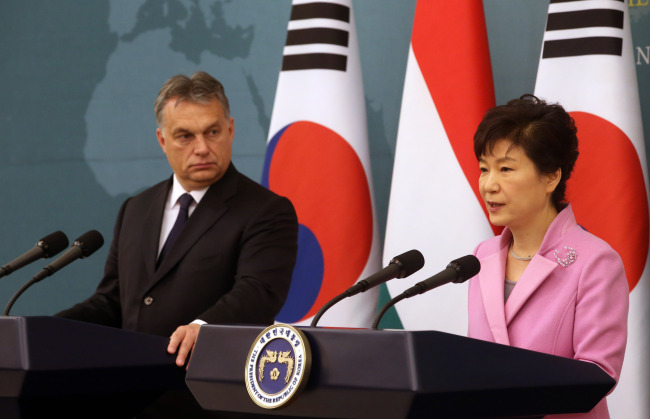The leaders of South Korea and Hungary on Friday agreed to strengthen their partnership and promote bilateral cooperation in the fields of economy, culture, science and education.
The agreement was made during summit talks between President Park Geun-hye and Hungarian Prime Minister Viktor Orban held at Cheong Wa Dae in Seoul, officials said.
Orban arrived in Seoul on Thursday for a three-day visit on Park’s invitation, they added.
“Thanks to Prime Minister Orban’s official trip to Korea, the partnership between the two countries has entered a new stage,” the two leaders said in their joint statement.
 |
| President Park Geun-hye speaks at a joint press conference with Hungarian Prime Minister Viktor Orban at Cheong Wa Dae on Friday. (Yonhap) |
“To commemorate the 25th anniversary of diplomatic ties between the two countries, we have agreed to develop and diversify the bilateral relationship in various fields of politics, economy, culture, science and education,” they said. Hungary was the first Eastern European nation to establish diplomatic relations with South Korea in 1989.
The two leaders also addressed concerns about North Korea’s nuclear weapons program and reaffirmed Hungary’s support of South Korea’s efforts to bring about peace on the Korean Peninsula. The Hungarian leader expressed his support of Park’s vision for building trust between two Koreas and also her plan to build a peace park near the Demilitarized Zone that separates the two Koreas.
“The prime minister’s visit to (South) Korea means a lot at this time when we are striving to establish the foundation for peaceful unification on the Korean Peninsula,” said Park during the summit. “I hope that Hungary can become a confident partner (of South Korea),” she said.
Orban told Park that many Hungarians feel friendly toward Koreans, and requested that she visit the European country soon.
The two leaders also stressed the importance of their economic and trade relations, underscoring that South Korean companies’ investment in Hungary has had a positive effects for both countries’ economic growth.
After the summit, the two countries signed a set of agreements and a memorandum of understanding. The signing ceremony was attended by the two leaders.
One of the agreements calls for a revision of an existing bilateral aviation deal to help increase trade and human exchanges.
Under the agreements, the two agreed to mutually recognize drivers’ licenses issued by the two countries. They also agreed to promote cooperation in education and banking technology.
By Cho Chung-un (christory@heraldcorp.com)



